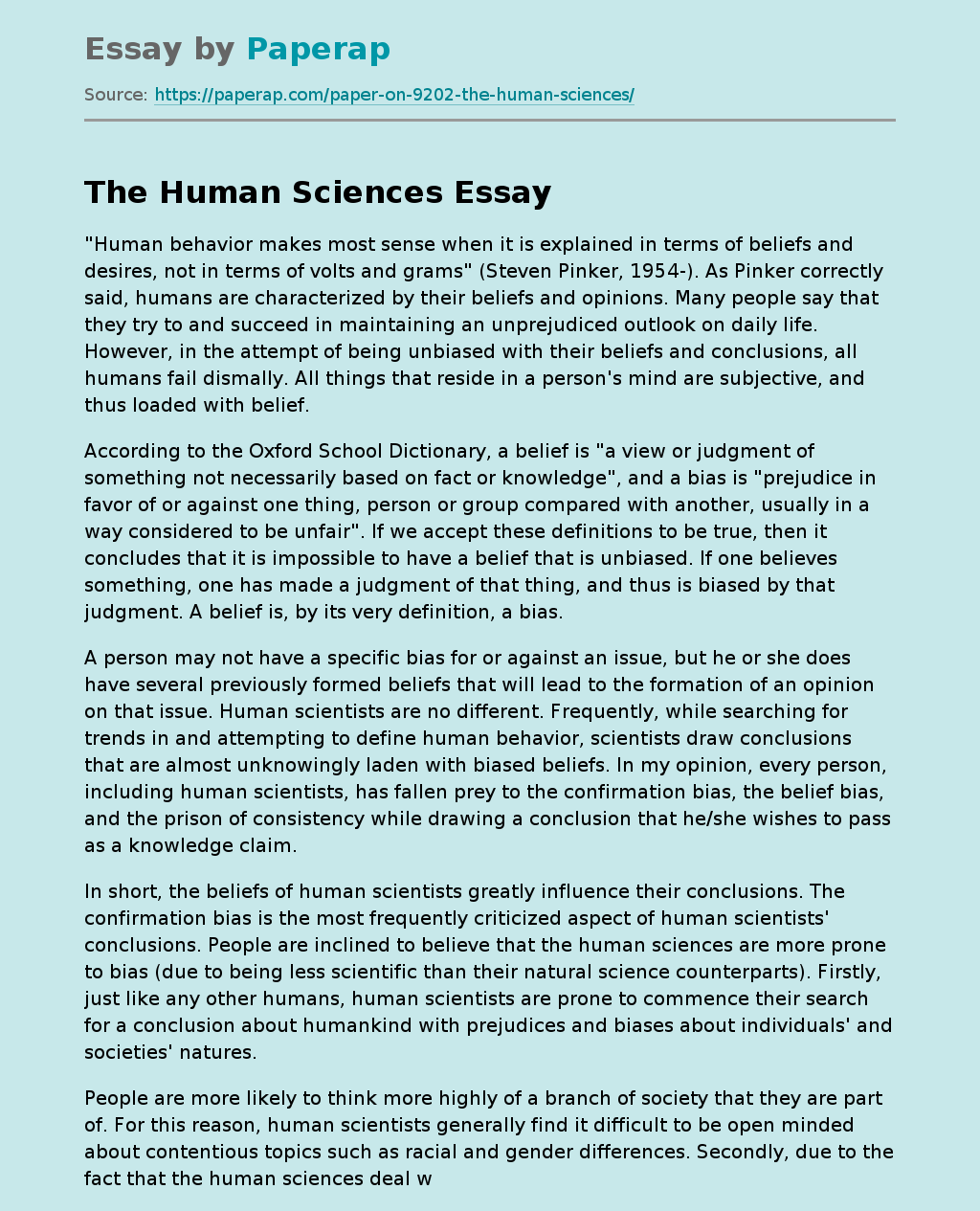The Human Sciences
“Human behavior makes most sense when it is explained in terms of beliefs and desires, not in terms of volts and grams” (Steven Pinker, 1954-). As Pinker correctly said, humans are characterized by their beliefs and opinions. Many people say that they try to and succeed in maintaining an unprejudiced outlook on daily life. However, in the attempt of being unbiased with their beliefs and conclusions, all humans fail dismally. All things that reside in a person’s mind are subjective, and thus loaded with belief.
According to the Oxford School Dictionary, a belief is “a view or judgment of something not necessarily based on fact or knowledge”, and a bias is “prejudice in favor of or against one thing, person or group compared with another, usually in a way considered to be unfair”. If we accept these definitions to be true, then it concludes that it is impossible to have a belief that is unbiased. If one believes something, one has made a judgment of that thing, and thus is biased by that judgment.
A belief is, by its very definition, a bias.
A person may not have a specific bias for or against an issue, but he or she does have several previously formed beliefs that will lead to the formation of an opinion on that issue. Human scientists are no different. Frequently, while searching for trends in and attempting to define human behavior, scientists draw conclusions that are almost unknowingly laden with biased beliefs. In my opinion, every person, including human scientists, has fallen prey to the confirmation bias, the belief bias, and the prison of consistency while drawing a conclusion that he/she wishes to pass as a knowledge claim.
In short, the beliefs of human scientists greatly influence their conclusions. The confirmation bias is the most frequently criticized aspect of human scientists’ conclusions. People are inclined to believe that the human sciences are more prone to bias (due to being less scientific than their natural science counterparts). Firstly, just like any other humans, human scientists are prone to commence their search for a conclusion about humankind with prejudices and biases about individuals’ and societies’ natures.
People are more likely to think more highly of a branch of society that they are part of. For this reason, human scientists generally find it difficult to be open minded about contentious topics such as racial and gender differences. Secondly, due to the fact that the human sciences deal with individuals, and people are more likely to form emotional attachments with people, rather than math theorems and atom nuclei, over-identification with humans that a scientist is supposed to be analyzing is almost unavoidable.
Just like Bruce Parry had to struggle to remain completely objective while on his stay with the Kombai tribe, human scientists struggle to remain free of previous belief and bias while drawing conclusions about humankind. All scientists, especially human scientists, are prone to being affected by bias and emotion when trying to use reason to conclude a general trend in humankind’s behavior. For this reason, there exist all kinds of controversies and disagreements in human science.
While trying to draw a conclusion, the confirmation bias leads to scientists only recognizing evidence that contributes to their conclusion. They only notice confirming evidence like such because they are biased to believe that their conclusion is true and they somehow have to prove it to be so. Perhaps the only solution to such confirmation biases is actively pursuing contradictory evidence, and analyzing and acknowledging criticisms that seek to discredit their biased research and conclusions.
The Human Sciences. (2017, Nov 21). Retrieved from https://paperap.com/paper-on-9202-the-human-sciences/

